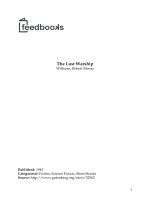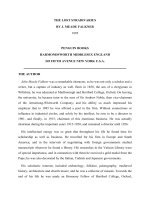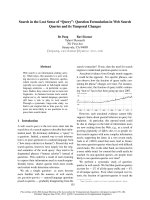The lost girl
Bạn đang xem bản rút gọn của tài liệu. Xem và tải ngay bản đầy đủ của tài liệu tại đây (1.45 MB, 399 trang )
TheProjectGutenbergeBook,TheLostGirl,byD.H.Lawrence
ThiseBookisfortheuseofanyoneanywhereatnocostandwith
almostnorestrictionswhatsoever.Youmaycopyit,giveitawayor
re-useitunderthetermsoftheProjectGutenbergLicenseincluded
withthiseBookoronlineatwww.gutenberg.org
Title:TheLostGirl
Author:D.H.Lawrence
ReleaseDate:December3,2007[eBook#23727]
LastUpdated:April19,2019
Language:English
***STARTOFTHEPROJECTGUTENBERGEBOOKTHELOSTGIRL***
E-textpreparedbyRogerFrank,RobertaStaehlin,andtheProject
GutenbergOnlineDistributedProofreadingTeam()
HTMLfileproducedbyDavidWidger
THELOSTGIRL
ByD.H.Lawrence
NewYork:ThomasSeltzer
1921
CONTENTS
CHAPTERI—THEDECLINEOFMANCHESTERHOUSE
CHAPTERII—THERISEOFALVINAHOUGHTON
CHAPTERIII—THEMATERNITYNURSE
CHAPTERIV—TWOWOMENDIE
CHAPTERV—THEBEAU
CHAPTERVI—HOUGHTON'SLASTENDEAVOUR
CHAPTERVII—NATCHA-KEE-TAWARA
CHAPTERVIII—CICCIO
CHAPTERIX—ALVINABECOMESALLAYE
CHAPTERX—THEFALLOFMANCHESTERHOUSE
CHAPTERXI—HONOURABLEENGAGEMENT
CHAPTERXII—ALLAYEALSOISENGAGED
CHAPTERXIII—THEWEDDEDWIFE
CHAPTERXIV—THEJOURNEYACROSS
CHAPTERXV—THEPLACECALLEDCALIFANO
CHAPTERXVI—SUSPENSE
CHAPTERI—THEDECLINEOFMANCHESTER
HOUSE
Take a mining townlet like Woodhouse, with a population of ten thousand
people,andthreegenerationsbehindit.Thisspaceofthreegenerationsarguesa
certainwell-establishedsociety.Theold"County"hasfledfromthesightofso
much disembowelled coal, to flourish on mineral rights in regions still idyllic.
Remains one great and inaccessible magnate, the local coal owner: three
generationsold,andclamberingonthebottomstepofthe"County,"kickingoff
themassbelow.Rulehimout.
AwellestablishedsocietyinWoodhouse,fulloffineshades,rangingfromthe
dark of coal-dust to grit of stone-mason and sawdust of timber-merchant,
throughthelustreoflardandbutterandmeat,totheperfumeofthechemistand
the disinfectant of the doctor, on to the serene gold-tarnish of bank-managers,
cashiers for the firm, clergymen and such-like, as far as the automobile
refulgence of the general-manager of all the collieries. Here the ne plus ultra.
Thegeneralmanagerlivesintheshrubberiedseclusionoftheso-calledManor.
ThegenuineHall,abandonedbythe"County,"hasbeentakenoverasofficesby
thefirm.
Here we are then: a vast substratum of colliers; a thick sprinkling of
tradespeople intermingled with small employers of labour and diversified by
elementary schoolmasters and nonconformist clergy; a higher layer of bankmanagers, rich millers and well-to-do ironmasters, episcopal clergy and the
managers of collieries, then the rich and sticky cherry of the local coal-owner
glisteningoverall.
SuchthecomplicatedsocialsystemofasmallindustrialtownintheMidlands
ofEngland,inthisyearofgrace1920.Butletusgobackalittle.Suchitwasin
thelastcalmyearofplenty,1913.
A calm year of plenty. But one chronic and dreary malady: that of the odd
women.Why,inthenameofallprosperity,shouldeveryclassbutthelowestin
suchasocietyhangoverburdenedwithDeadSeafruitofoddwomen,unmarried,
unmarriageablewomen,calledoldmaids?Whyisitthateverytradesman,every
school-master, every bank-manager, and every clergyman produces one, two,
threeormoreoldmaids?Dothemiddle-classes,particularlythelowermiddleclasses, give birth to more girls than boys? Or do the lower middle-class men
assiduously climb up or down, in marriage, thus leaving their true partners
stranded? Or are middle-class women very squeamish in their choice of
husbands?
Howeveritbe,itisatragedy.Orperhapsitisnot.
Perhapstheseunmarriedwomenofthemiddle-classesarethefamoussexlessworkersofourant-industrialsociety,ofwhichwehearsomuch.Perhapsallthey
lack is an occupation: in short, a job. But perhaps we might hear their own
opinion,beforewelaythelawdown.
InWoodhouse,therewasaterriblecropofoldmaidsamongthe"nobs,"the
tradespeopleandtheclergy.Thewholetownofwomen,colliers'wivesandall,
helditsbreathasitsawachanceofoneofthesedaughtersofcomfortandwoe
getting off. They flocked to the well-to-do weddings with an intoxication of
relief. For let class-jealousy be what it may, a woman hates to see another
womanleftstalelyontheshelf,withoutachance.Theyallwanted themiddleclassgirlstofindhusbands.Everyonewantedit,includingthegirlsthemselves.
Hencethedismalness.
NowJamesHoughtonhadonlyonechild:hisdaughterAlvina.SurelyAlvina
Houghton—
But let us retreat to the early eighties, when Alvina was a baby: or even
further back, to the palmy days of James Houghton. In his palmy days, James
HoughtonwascrêmedelacrêmeofWoodhousesociety.ThehouseofHoughton
had always been well-to-do: tradespeople, we must admit; but after a few
generations of affluence, tradespeople acquire a distinct cachet. Now James
Houghton, at the age of twenty-eight, inherited a splendid business in
Manchestergoods,inWoodhouse.Hewasatall,thin,elegantyoungmanwith
side-whiskers,genuinelyrefined,somewhatintheBulwerstyle.Hehadataste
for elegant conversation and elegant literature and elegant Christianity: a tall,
thin,brittleyoungman,ratherflutteringinhismanner,fulloffacileideas,and
withabeautifulspeakingvoice:mostbeautiful.Withal,ofcourse,atradesman.
He courted a small, dark woman, older than himself, daughter of a Derbyshire
squire.Heexpectedtogetatleasttenthousandpoundswithher.Inwhichhewas
disappointed, for he got only eight hundred. Being of a romantic-commercial
nature, he never forgave her, but always treated her with the most elegant
courtesy.Toseehimpeelandprepareanappleforherwasanexquisitesight.But
that peeled and quartered apple was her portion. This elegant Adam of
commercegaveEveherownback,nicelycored,andhadnomoretodowithher.
MeanwhileAlvinawasborn.
Before all this, however, before his marriage, James Houghton had built
ManchesterHouse.Itwasavastsquarebuilding—vast,thatis,forWoodhouse
—standingonthemainstreetandhigh-roadofthesmallbutgrowingtown.The
lowerfrontconsistedoftwofineshops,oneforManchestergoods,oneforsilk
andwoollens.ThiswasJamesHoughton'scommercialpoem.
ForJamesHoughtonwasadreamer,andsomethingofapoet:commercial,be
itunderstood.HelikedthenovelsofGeorgeMacdonald,andthefantasiesofthat
author, extremely. He wove one continual fantasy for himself, a fantasy of
commerce. He dreamed of silks and poplins, luscious in texture and of
unforeseen exquisiteness: he dreamed of carriages of the "County" arrested
before his windows, of exquisite women ruffling charmed, entranced to his
counter. And charming, entrancing, he served them his lovely fabrics, which
onlyheandtheycouldsufficientlyappreciate.Hisfamespread,untilAlexandra,
Princess of Wales, and Elizabeth, Empress of Austria, the two best-dressed
women in Europe, floated down from heaven to the shop in Woodhouse, and
salliedforthtoshowwhatcouldbedonebypurchasingfromJamesHoughton.
We cannot say why James Houghton failed to become the Liberty or the
Snelgroveofhisday.Perhapshehadtoomuchimagination.Bethatasitmay,in
thoseearlydayswhenhebroughthiswifetohernewhome,hiswindowonthe
Manchester side was a foam and a may-blossom of muslins and prints, his
window on the London side was an autumn evening of silks and rich fabrics.
Whatwifecouldfailtobedazzled!Butshe,poordarling,fromherstonehallin
stony Derbyshire, was a little bit repulsed by the man's dancing in front of his
stock,likeDavidbeforetheark.
The home to which he brought her was a monument. In the great bedroom
over the shop he had his furniture built: built of solid mahogany: oh too, too
solid. No doubt he hopped or skipped himself with satisfaction into the
monstrousmatrimonialbed:itcouldonlybemountedbymeansofastooland
chair.Butthepoor,secludedlittlewoman,olderthanhe,musthaveclimbedup
with a heavy heart, to lie and face the gloomy Bastille of mahogany, the great
cupboardopposite,ortoturnwearilysidewaystothegreatchevalmirror,which
performed a perpetual and hideous bow before her grace. Such furniture! It
couldneverberemovedfromtheroom.
The little child was born in the second year. And then James Houghton
decamped to a small, half-furnished bedroom at the other end of the house,
wherehesleptonaroughboardandplayedtheanchoritefortherestofhisdays.
Hiswifewasleftalonewithherbabyandthebuilt-infurniture.Shedeveloped
heartdisease,asaresultofnervousrepressions.
But like a butterfly James fluttered over his fabrics. He was a tyrant to his
shop-girls.NoFrenchmarquisinaDickens'novelcouldhavebeenmoreelegant
andraffinéandheartless.Thegirlsdetestedhim.Andyet,hiscuriousrefinement
and enthusiasm bore them away. They submitted to him. The shop attracted
much curiosity. But the poor-spirited Woodhouse people were weak buyers.
TheyweariedJamesHoughtonwiththeirdemandforcommonzephyrs,forred
flannel which they would scallop with black worsted, for black alpacas and
bombazines and merinos. He fluffed out his silk-striped muslins, his India
cotton-prints. But the natives shied off as if he had offered them the poisoned
robesofHerakles.
There was a sale. These sales contributed a good deal to Mrs. Houghton's
nervousheart-disease.Theybroughtthefirstsignsofwearandtearintotheface
ofJamesHoughton.Atfirst,ofcourse,hemerelymarkeddown,withdiscretion,
his less-expensive stock of prints and muslins, nuns-veilings and muslin
delaines, with a few fancy braidings and trimmings in guimp or bronze to
enliventheaffair.AndWoodhouseboughtcautiously.
Afterthesale,however,JamesHoughtonfelthimselfatlibertytoplungeinto
an orgy of new stock. He flitted, with a tense look on his face, to Manchester.
After which huge bundles, bales and boxes arrived in Woodhouse, and were
dumped on the pavement of the shop. Friday evening came, and with it a
revelationinHoughton'swindow:thefirstpiqués,thefirststrangely-wovenand
honey-combed toilet covers and bed quilts, the first frill-caps and aprons for
maid-servants:awonderinwhite.ThatwashowJamesadvertisedit."AWonder
in White." Who knows but that he had been reading Wilkie Collins' famous
novel!
As the nine days of the wonder-in-white passed and receded, James
disappearedinthedirectionofLondon.AfewFridayslaterhecameoutwithhis
WinterTouch.Weirdandwonderfulwintercoats,forladies—everythingJames
handled was for ladies, he scorned the coarser sex—: weird and wonderful
wintercoatsforladies,ofthick,black,pockmarkedcloth,stoodandflourished
their bear-fur cuffs in the background, while tippets, boas, muffs and winterfancies coquetted in front of the window-space. Friday-night crowds gathered
outside: the gas-lamps shone their brightest: James Houghton hovered in the
background like an author on his first night in the theatre. The result was a
sensation. Ten villages stared and crushed round the plate glass. It was a
sensation:butwhatsensation!Inthebreastsofthecrowd,wonder,admiration,
fear, and ridicule. Let us stress the word fear. The inhabitants of Woodhouse
were afraid lest James Houghton should impose his standards upon them. His
goodswereinexcellenttaste:buthiscustomerswereinasbadtasteaspossible.
Theystoodoutsideandpointed,giggled,andjeered.PoorJames,likeanauthor
onhisfirstnight,sawhisworkfallmorethanflat.
Butstillhebelievedinhisownexcellence:andquitejustly.Whathefailedto
perceive was that the crowd hated excellence. Woodhouse wanted a gently
graduatedprogressinmediocrity,amediocritysostaleandflatthatitfelloutside
the imagination of any sensitive mortal. Woodhouse wanted a series of vulgar
little thrills, as one tawdry mediocrity was imported from Nottingham or
BirminghamtotaketheplaceofsometawdrymediocritywhichNottinghamand
Birminghamhadalreadydiscarded.ThatWoodhouse,asaveryconditionofits
ownbeing,hatedanyapproachtooriginalityorrealtaste,thisJamesHoughton
couldneverlearn.Hethoughthehadnotbeencleverenough,whenhehadbeen
far, far too clever already. He always thought that Dame Fortune was a
capricious and fastidious dame, a sort of Elizabeth of Austria or Alexandra,
Princess of Wales, elegant beyond his grasp. Whereas Dame Fortune, even in
LondonorVienna,letaloneinWoodhouse,wasavulgarwomanofthemiddle
and lower middle-class, ready to put her heavy foot on anything that was not
vulgar, machine-made, and appropriate to the herd. When he saw his delicate
originalities, as well as his faint flourishes of draper's fantasy, squashed flat
under the calm and solid foot of vulgar Dame Fortune, he fell into fits of
depression bordering on mysticism, and talked to his wife in a vague way of
higherinfluencesandtheangelIsrafel.She,poorlady,wasthoroughlyscaredby
Israfel,andcompletelyunhookedbythevagariesofJames.
At last—we hurry down the slope of James' misfortunes—the real days of
Houghton's Great Sales began. Houghton's Great Bargain Events were really
events.Aftersomeyearsofhangingon,heletgosplendidly.Hemarkeddown
his prints, his chintzes, his dimities and his veilings with a grand and lavish
hand.Bangwenthisbluepencilthrough3/11,andnoblyhesubscribed1/0-3/4.
Prices fell like nuts. A lofty one-and-eleven rolled down to six-three, 1/6
magicallyshrankinto4-3/4d,whilstgoodsolidprintsexposedthemselvesat33/4dperyard.
Now this was really an opportunity. Moreover the goods, having become a
littlestaleduringtheiryearsofineffectuality,werebeginningtoapproximateto
the public taste. And besides, good sound stuff it was, no matter what the
pattern.AndsothelittleWoodhousegirlswenttoschoolinpettiesanddrawers
madeofmaterialwhichJameshaddestinedforfairsummerdresses:pettiesand
drawers of which the little Woodhouse girls were ashamed, for all that. For if
theyshouldchancetoturnuptheirlittleskirts,besuretheywouldraiseachorus
amongtheircompanions:"Yah-h-h,yer'vegotHoughton'sthrep'nydrawson!"
All this time James Houghton walked on air. He still saw the Fata Morgana
snatchinghisfabricsroundherlovelyform,andpointinghimtowealthuntold.
True, he became also Superintendent of the Sunday School. But whether this
was an act of vanity, or whether it was an attempt to establish an Entente
Cordialewithhigherpowers,whoshalljudge.
Meanwhilehiswifebecamemoreandmoreaninvalid;thelittleAlvinawasa
pretty, growing child. Woodhouse was really impressed by the sight of Mrs.
Houghton,small,paleandwithheld,takingawalkwithherdaintylittlegirl,so
fresh in an ermine tippet and a muff. Mrs. Houghton in shiny black bear's-fur,
thechildinthewhiteandspottedermine,passingsilentandshadowydownthe
street,madeanimpressionwhichthepeopledidnotforget.
But Mrs. Houghton had pains at her heart. If, during her walk, she saw two
littleboyshavingascrimmage,shehadtoruntothemwithpenceandentreaty,
leavingthemdumfounded,whilstsheleanedblueatthelipsagainstawall.Ifshe
saw a carter crack his whip over the ears of the horse, as the horse laboured
uphill,shehadtocoverhereyesandavertherface,andallherstrengthlefther.
So she stayed more and more in her room, and the child was given to the
charge of a governess. Miss Frost was a handsome, vigorous young woman of
aboutthirtyyearsofage,withgrey-whitehairandgold-rimmedspectacles.The
whitehairwasnotatalltragical:itwasafamilytrait.
MissFrostmatteredmorethanany oneelseto AlvinaHoughton,duringthe
first long twenty-five years of the girl's life. The governess was a strong,
generouswoman,amusicianbynature.Shehadasweetvoice,andsanginthe
choir of the chapel, and took the first class of girls in the Sunday-School of
which James Houghton was Superintendent. She disliked and rather despised
James Houghton, saw in him elements of a hypocrite, detested his airy and
graciousselfishness,hislackofhumanfeeling,andmostofall,hisfairyfantasy.
AsJameswentfurtherintolife, hebecameadreamer.Sadindeed thathedied
beforethedaysofFreud.Heenjoyedthemostwonderfulandfairy-likedreams,
whichhecoulddescribeperfectly,incharming,delicatelanguage.Atsuchtimes
his beautifully modulated voice all but sang, his grey eyes gleamed fiercely
under his bushy, hairy eyebrows, his pale face with its side-whiskers had a
strangelueur,hislongthinhandsflutteredoccasionally.Hehadbecomemeagre
infigure,hisskimpybutgenteelcoatwouldbebuttonedoverhisbreast,ashe
recountedhisdream-adventures,adventuresthatwerehalfEdgarAllanPoe,half
Andersen, with touches of Vathek and Lord Byron and George Macdonald:
perhaps more than a touch of the last. Ladies were always struck by these
accounts.ButMissFrostneverfeltsostronglymovedtoimpatienceaswhenshe
waswithinhearing.
Fortwentyyears,sheandJamesHoughtontreatedeachotherwithacourteous
distance. Sometimes she broke into open impatience with him, sometimes he
answeredhertartly:"Indeed,indeed!Oh,indeed!Well,well,I'msorryyoufind
itso—"asiftheinjuryconsistedinherfindingitso.Thenhewouldflitawayto
theConservativeClub,withafleet,light,hurriedstep,asifpressedbyfate.At
theclubheplayedchess—atwhichhewasexcellent—andconversed.Thenhe
flittedbackathalf-pasttwelve,todinner.
ThewholemoraleofthehouserestedimmediatelyonMissFrost.Shesawher
lineinthefirstyear.ShemustdefendthelittleAlvina,whomshelovedasher
own, and the nervous, petulant, heart-stricken woman, the mother, from the
vagariesofJames.NotthatJameshadanyvices.Hedidnotdrinkorsmoke,was
abstemiousandcleanasananchorite,andneverloweredhisfinetone.Butstill,
thetwounprotectedonesmustbeshelteredfromhim.MissFrostimperceptibly
took into her hands the reins of the domestic government. Her rule was quiet,
strong, and generous. She was not seeking her own way. She was steering the
poor domestic ship of Manchester House, illuminating its dark rooms with her
ownsure,radiantpresence:hersilver-whitehair,andherpale,heavy,reposeful
faceseemedtogiveoffacertain radiance. Sheseemed togiveweight,ballast,
andreposetothestaggeringandbewilderedhome.Shecontrolledthemaid,and
suggestedthemeals—mealswhichJamesatewithoutknowingwhatheate.She
brought in flowers and books, and, very rarely, a visitor. Visitors were out of
place in the dark sombreness of Manchester House. Her flowers charmed the
petulant invalid, her books she sometimes discussed with the airy James: after
which discussions she was invariably filled with exasperation and impatience,
whilst James invariably retired to the shop, and was heard raising his musical
voice,whichthework-girlshated,tooneorotherofthework-girls.
James certainly had an irritating way of speaking of a book. He talked of
incidents, and effects, and suggestions, as if the whole thing had just been a
sensational-æsthetic attribute to himself. Not a grain of human feeling in the
man, said Miss Frost, flushing pink with exasperation. She herself invariably
tookthehumanline.
Meanwhiletheshopsbegantotakeonahopelessandfrowsylook.Afterten
years'sales,springsales,summersales,autumnsales,wintersales,Jamesbegan
to give up the drapery dream. He himself could not bear any more to put the
heavy, pock-holed black cloth coat, with wild bear cuffs and collar, on to the
stand. He had marked it down from five guineas to one guinea, and then, oh
ignobleday,toten-and-six.Henearlykissedthegipsywomanwithabasketof
tinsaucepan-lids,whenatlastsheboughtitforfiveshillings,attheendofone
ofhiswintersales.Butevenshe,inspiteofthebittersleetyday,wouldnotput
thecoatonintheshop.ShecarrieditoverherarmdowntotheMiners'Arms.
Andlater,withashockthatreallyhurthim,James,peepingbird-likeoutofhis
shopdoor,sawhersittingdrivingadirtyrag-and-bonecartwithagreen-white,
mouldy pony, and flourishing her arms like some wild and hairy-decorated
squaw.Forthelongbear-fur,wetwithsleet,seemedlikeachevauxdefriseof
long porcupine quills round her fore-arms and her neck. Yet such good, such
wonderfulmaterial!Jameseyeditforonemoment,andthenfledlikearabbitto
thestoveinhisbackregions.
The higher powers did not seem to fulfil the terms of treaty which James
hoped for. He began to back out from the Entente. The Sunday School was a
greattrialtohim.Insteadofbeingcarriedawaybyhisgraceandeloquence,the
nasty louts of colliery boys and girls openly banged their feet and made
deafening noises when he tried to speak. He said many acid and withering
things, as he stood there on the rostrum. But what is the good of saying acid
thingstothoselittlefiendsandgall-bladders,thecollierychildren.Thesituation
was saved by Miss Frost's sweeping together all the big girls, under her
surveillance,andbyherorganizingthatthetallandhandsomeblacksmithwho
taught the lower boys should extend his influence over the upper boys. His
influencewasmorethaneffectual.Itconsistedingrippinganyrecalcitrantboy
justabovetheknee,andjestingwithhiminajocularmanner,inthedialect.The
blacksmith's hand was all a blacksmith's hand need be, and his dialect was as
broadascouldbewished.Betweenthegripandthehomelyidiomnoboycould
endurewithout squealing.SotheSundaySchoolpaidmoreattentiontoJames,
whoseprayerswerebeautiful.Butthenoneoftheboys,aprotegéofMissFrost,
havingbeenleftforhalfanhourintheobscureroomwithMrs.Houghton,gave
awaythesecretoftheblacksmith'sgrip,whichsecretsohauntedthepoorlady
thatitmarkedastageintheincreaseofhermalady,andmadeSundayafternoon
anightmaretoher.AndthenJamesHoughtonresentedsomethinginthecoarse
Scotch manner of the minister of that day. So that the superintendency of the
SundaySchoolcametoanend.
Atthesametime,Solomonhadtodividehisbaby.Thatis,helettheLondon
side of his shop to W. H. Johnson, the tailor and haberdasher, a parvenu little
fellow whose English would not bear analysis. Bitter as it was, it had to be.
Carpenters and joiners appeared, and the premises were completely severed.
Fromherroomintheshadowsatthebacktheinvalidheardthehammeringand
sawing, and suffered. W. H. Johnson came out with a spick-and-span window,
and had his wife, a shrewd, quiet woman, and his daughter, a handsome, loud
girl,tohelphimonFridayevenings.Menflockedin—evenwomen,buyingtheir
husbandsasixpence-halfpennytie.Theycouldhaveboughtatieforfour-three
from James Houghton. But no, they would rather give sixpence-halfpenny for
W.H. Johnson's fresh but rubbishy stuff. And James, who had tried to rise to
anothersuccessfulsale,sawthestreamspassintotheotherdoorway,andheard
theheavyfeetonthehollowboardsoftheothershop:hisshopnomore.
After this cut at his pride and integrity he lay in retirement for a while,
mysticallyinclined.ProbablyhewouldhavecometoSwedenborg,hadnothis
cliptwingsspreadforanewflight.Hehituponthebrilliantideaofworkingup
his derelict fabrics into ready-mades: not men's clothes, oh no: women's, or
rather,ladies'.Ladies'Tailoring,saidthenewannouncement.
James Houghton was happy once more. A zig-zag wooden stair-way was
rigged up the high back of Manchester House. In the great lofts sewingmachinesofvariouspatternsandmovementswereinstalled.Amanageresswas
advertisedfor,andwork-girlswerehired.Soanewphaseoflifestarted.Athalfpastsixinthemorningtherewasaclatteroffeetandofgirls'excitedtongues
along the back-yard and up the wooden stair-way outside the back wall. The
poorinvalidheardeveryclackandeveryvibration.Shecouldnevergetoverher
nervousapprehensionofaninvasion.Everymorningalike,shefeltaninvasion
ofsomeenemywasbreakinginonher.Andalldaylongthelow,steadyrumble
ofsewing-machinesoverheadseemedlikethelowdrummingofabombardment
uponherweakheart.Tomakemattersworse,JamesHoughtondecidedthathe
musthavehissewing-machinesdrivenbysomeextra-humanforce.Heinstalled
another plant of machinery—acetylene or some such contrivance—which was
intended to drive all the little machines from one big belt. Hence a further
throbbing and shaking in the upper regions, truly terrible to endure. But,
fortunatelyorunfortunately,theacetyleneplantwasnotasuccess.Girlsgottheir
thumbs pierced, and sewing machines absolutely refused to stop sewing, once
theyhadstarted,andabsolutelyrefusedtostart,oncetheyhadstopped.Sothat
afterawhile,oneloftwasreservedfordisusedandrusty,butexpensiveengines.
Dame Fortune, who had refused to be taken by fine fabrics and fancy
trimmings,wasjustasreluctanttobecapturedbyready-mades.Againthegood
dame was thoroughly lower middle-class. James Houghton designed "robes."
NowRobeswerethemode.PerhapsitwasAlexandra,PrincessofWales,who
gave glory to the slim, glove-fitting Princess Robe. Be that as it may, James
Houghton designed robes. His work-girls, a race even more callous than shopgirls,proclaimedthefactthatJamestriedonhisowninventionsuponhisown
elegantthinperson,beforetheprivacyofhisownchevalmirror.Andevenifhe
did,whynot?MissFrost,hearingthislegend,lookedsidewaysattheenthusiast.
Let us remark in time that Miss Frost had already ceased to draw any
maintenance from James Houghton. Far from it, she herself contributed to the
upkeepofthedomestichearthandboard.Shehadfullydecidednevertoleave
her two charges. She knew that a governess was an impossible item in
ManchesterHouse,asthingswent.Andsoshetrudgedthecountry,givingmusic
lessons to the daughters of tradesmen and of colliers who boasted pianofortes.
She even taught heavy-handed but dauntless colliers, who were seized with a
passion to "play." Miles she trudged, on her round from village to village: a
white-haired woman with a long, quick stride, a strong figure, and a quick,
handsome smile when once her face awoke behind her gold-rimmed glasses.
Likemanyshort-sightedpeople,shehadacertainintentlookofonewhogoes
herownway.
Theminersknewher,andentertainedthehighestrespectandadmirationfor
her.Astheystreamedinagrimystreamhomefrompit,theydivergedlikesome
magicdarkriverfromoffthepavementintothehorse-way,togiveherroomas
sheapproached.Andthemenwhoknewherwellenoughtosaluteher,bycalling
hername"MissFrost!"givingittheproperintonationofsalute,werefussymen
indeed. "She's a lady if ever there was one," they said. And they meant it.
Hearinghername,poorMissFrostwouldflashasmileandanodfrombehind
herspectacles,butwhoseblackfaceshesmiledtoshenever,orrarelyknew.If
shedidchancetogetaninkling,thengladlyshecalledinreply"Mr.Lamb,"or
"Mr.Calladine."Inherwayshewasaproudwoman,forshewasregardedwith
cordialrespect,touchedwithveneration,byatleastathousandcolliers,andby
perhapsasmanycolliers'wives.Thatissomething,foranywoman.
MissFrostchargedfifteenshillingsforthirteenweeks'lessons,twolessonsa
week. And at that she was considered rather dear. She was supposed to be
making money. What money she made went chiefly to support the Houghton
household. In the meanwhile she drilled Alvina thoroughly in theory and
pianoforte practice, for Alvina was naturally musical, and besides this she
imparted to the girl the elements of a young lady's education, including the
drawingofflowersinwater-colour,andthetranslationofaLamartinepoem.
Nowincredibleasitmayseem,fatethrewanotherproptothefallinghouseof
Houghton, in the person of the manageress of the work-girls, Miss Pinnegar.
JamesHoughton complainedofFortune,yettowhatothermanwouldFortune
have sent two such women as Miss Frost and Miss Pinnegar, gratis?Yetthere
theywere.AnddoubtfulifJameswasevergratefulfortheirpresence.
If Miss Frost saved him from heaven knows what domestic débâcle and
horror,MissPinnegarsavedhimfromtheworkhouse.Letusnotmincematters.
For a dozen years Miss Frost supported the heart-stricken, nervous invalid,
Clariss Houghton: for more than twenty years she cherished, tended and
protectedtheyoungAlvina,shieldingthechildalikefromaneuroticmotherand
afathersuchasJames.Fornearlytwentyyearsshesawthatfoodwassetonthe
table, and clean sheets were spread on the beds: and all the time remained
virtuallyinthepositionofanoutsider,withoutonegrainofestablishedauthority.
AndthentofindMissPinnegar!Inherway,MissPinnegarwasverydifferent
fromMissFrost.Shewasarathershort,stout,mouse-coloured,creepykindof
womanwithahighcolourinhercheeks,anddun,closehairlikeacap.Itwas
evidentshewasnotalady:hergrammarwasnotwithoutreproach.Shehadpale
greyeyes,andapaddingstep,andasoftvoice,andalmostpurplishcheeks.Mrs.
Houghton, Miss Frost, and Alvina did not like her. They suffered her
unwillingly.
But from the first she had a curious ascendancy over James Houghton. One
would have expected his æsthetic eye to be offended. But no doubt it was her
voice:hersoft,near,surevoice,whichseemedalmostlikeasecrettouchupon
herhearer.Nowmanyofherhearersdislikedbeingsecretlytouched,asitwere
beneath their clothing. Miss Frost abhorred it: so did Mrs. Houghton. Miss
Frost'svoicewasclearandstraightasabell-note,openastheday.YetAlvina,
thoughinloyaltysheadheredtoherbelovedMissFrost,didnotreallymindthe
quiet suggestive power of Miss Pinnegar. For Miss Pinnegar was not vulgarly
insinuating. On the contrary, the things she said were rather clumsy and
downright.Itwasonlythatsheseemedtoweighwhatshesaid,secretly,before
she said it, and then she approached as if she would slip it into her hearer's
consciousness without his being aware of it. She seemed to slide her speeches
unnoticed into one's ears, so that one accepted them without the slightest
challenge. That was just her manner of approach. In her own way, she was as
loyal and unselfish as Miss Frost. There are such poles of opposition between
honestiesandloyalties.
Miss Pinnegar had the second class of girls in the Sunday School, and she
took second, subservient place in Manchester House. By force of nature, Miss
Frosttookfirstplace.OnlywhenMissPinnegar spoketoMr.Houghton—nay,
the very way she addressed herself to him—"What do you think, Mr.
Houghton?"—thenthereseemedtobeassumedanimmediacyofcorrespondence
between the two, and an unquestioned priority in their unison, his and hers,
which was a cruel thorn in Miss Frost's outspoken breast. This sort of secret
intimacy and secret exulting in having, really, the chief power, was most
repugnanttothewhite-hairedwoman.Notthattherewas,infact,anysecrecy,or
any form of unwarranted correspondence between James Houghton and Miss
Pinnegar.Farfromit.Eachofthemwouldhavefoundanysuggestionofsucha
possibility repulsive in the extreme. It was simply an implicit correspondence
betweentheirtwopsyches,animmediacyofunderstandingwhichprecededall
expression,tacit,wireless.
Miss Pinnegar lived in: so that the household consisted of the invalid, who
mostlysat,inherblackdresswithawhitelacecollarfastenedbyatwistedgold
brooch,inherowndimroom,doingnothing,nervousandheart-suffering;then
James,andthethinyoungAlvina,whoadheredtoherbelovedMissFrost,and
then these two strange women. Miss Pinnegar never lifted up her voice in
household affairs: she seemed, by her silence, to admit her own inadequacy in
cultureandintellect,whentopicsofinterestwerebeingdiscussed,onlycoming
outnowandthenwithdefiantplatitudesandtruisms—foralmostdefiantlyshe
tookthecommonplace,vulgarianpointofview;yetaftereverythingshewould
turnwithherquiet,triumphantassurancetoJamesHoughton,andstartonsome
pointofbusiness,soft,assured,ascendant.Theothersshuttheirears.
NowMissPinnegarhadtogetherfootingslowly.ShehadtoletJamesrunthe
gamut of his creations. Each Friday night new wonders, robes and ladies'
"suits"—thephrasewasverynew—garnishedthewindowofHoughton'sshop.It
wasoneofthesightsoftheplace,Houghton'swindowonFridaynight.Youngor
old, no individual, certainly no female left Woodhouse without spending an
excited and usually hilarious ten minutes on the pavement under the window.
Muffledshrieksofyoungdamselswhohadjustgottheirfirstview,guffawsof
sympathetic youths, continued giggling and expostulation and "Eh, but what
pricetheumbrellaskirt,mygirl!"and"You'dliketomarrymeinthat,myboy—
what?nothalf!"—orelse"Eh,now,ifyou'dseenmeinthatyou'dhavefallenin
love with me at first sight, shouldn't you?"—with a probable answer "I should
havefallenovermyselfmakinghastetogetaway"—loudguffaws:—allthiswas
theregularFridaynight'sentertainmentinWoodhouse.JamesHoughton'sshop
was regarded as a weekly comic issue. His piqué costumes with glass buttons
andsortofsteel-trimmingcollarsandcuffswereimmortal.
Butwhy,oncemore,dragitout.MissPinnegarservedintheshoponFriday
nights. She stood by her man. Sometimes when the shrieks grew loudest she
cametotheshopdoorandlookedwithherpalegreyeyesattheridiculousmob
of lasses in tam-o-shanters and youths half buried in caps. And she imposed a
silence.Theyedgedaway.
MeanwhileMissPinnegarpursuedthesoberandeventenorofherownway.
Whilst James lashed out, to use the local phrase, in robes and "suits," Miss
Pinnegar steadily ground away, producing strong, indestructible shirts and
singlets for the colliers, sound, serviceable aprons for the colliers' wives, good
printdressesforservants,andsoon.Sheexecutednoflightsoffancy.Shehad
her goods made to suit her people. And so, underneath the foam and froth of
James'creativeadventureflowedaslowbutsteadystreamofoutputandincome.
The women of Woodhouse came at last to depend on Miss Pinnegar. Growing
ladsinthepitreducetheirgarmentstoshredswithamazingexpedition."I'llgo
to Miss Pinnegar for thy shirts this time, my lad," said the harassed mothers,
"and see if they'll stand thee." It was almost like a threat. But it served
ManchesterHouse.
Jamesboughtverylittlestockinthesedays:justremnantsandpiecesforhis
immortal robes. It was Miss Pinnegar who saw the travellers and ordered the
unions and calicoes and grey flannel. James hovered round and said the last
word, of course. But what was his last word but an echo of Miss Pinnegar's
penultimate!Hewasnotinterestedinunionsandtwills.
Hisownstockremainedonhand.Time,likeaslowwhirlpoolchurneditover
intosightandoutofsight,likeamassofdeadsea-weedinabackwash.There
wasaregularseriesofsalesfortnightly.Thedisplayof"creations"felloff.The
newentertainmentwastheFriday-night'ssale.Jameswouldattacksomeportion
of his stock, make a wild jumble of it, spend a delirious Wednesday and
Thursday marking down, and then open on Friday afternoon. In the evening
therewasacrush.Agoodmoiréunderskirtforone-and-eleven-threewasnotto
beneglected,andahandsomestring-lacecollaretteforsix-threewouldironout
andbeworthatleastthree-and-six.Thatwashowitwent:itwouldnearlyallof
it iron out into something really nice, poor James' crumpled stock. His fine,
semi-transparentfaceflushedpink,hiseyesflashedashetookinthesixpences
and handed back knots of tape or packets of pins for the notorious farthings.
Whatmatterifthefarthingchangehadoriginallycosthimahalfpenny!Hisshop
was crowded with women peeping and pawing and turning things over and
commenting in loud, unfeeling tones. For there were still many comic items.
Once, for example, he suddenly heaped up piles of hats, trimmed and
untrimmed,theweirdest,sauciest,mostscreamingshapes.Woodhouseenjoyed
itselfthatnight.
And all the time, in her quiet, polite, think-the-more fashion Miss Pinnegar
waitedonthepeople,showingthemconsiderableforbearanceandjustatingeof
contempt. She became very tired those evenings—her hair under its invisible
hairnet became flatter, her cheeks hung down purplish and mottled. But while
Jamesstoodshestood.Thepeopledidnotlikeher,yetsheinfluencedthem.And
thestockslowlywilted,withered.Somewasscrapped.Theshopseemedtohave
digestedsomeofitsindigestiblecontents.
Jamesaccumulatedsixpencesinamiserlyfashion.Luckilyforherwork-girls,
Miss Pinnegar took her own orders, and received payments for her own
productions.Someofherregularcustomerspaidherashillingaweek—orless.
Butitmadeasmall,steadyincome.Shereservedherownmodestshare,paidthe
expensesofherdepartment,andlefttheresiduetoJames.
Jameshadaccumulatedsixpences,andmadealittlespaceinhisshop.Hehad
desistedfrom"creations."Timenowforanewflight.Hedecideditwasbetterto
beamanufacturerthanatradesman.Hisshop,alreadyonlyhalfitsoriginalsize,
wasagaintoobig.Itmightbesplitoncemore.RentshadriseninWoodhouse.
Whynotcutoffanothershopfromhispremises?
No sooner said than done. In came the architect, with whom he had played
many a game of chess. Best, said the architect, take off one good-sized shop,
ratherthanhalvethepremises.Jameswouldbeleftalittlecramped,alittletight,
withonlyone-thirdofhispresentspace.Butasweagewedwindle.
Morehammeringandalterations,andJamesfoundhimselfcoopedinalong,
longnarrowshop,verydarkattheback,withahighoblongwindowandadoor
thatcameinatapinchedcorner.Nextdoortohimwasacheerfulnewgrocerof
the cheap and florid type. The new grocer whistled "Just Like the Ivy," and
shouted boisterously to his shop-boy. In his doorway, protruding on James'
sensitivevision,wasapyramidofsixpence-halfpennytinsofsalmon,red,shiny
tins with pink halved salmons depicted, and another yellow pyramid of fourpence-halfpenny tins of pineapple. Bacon dangled in pale rolls almost over
James'doorway,whilststrawandpaper,redolentofcheese,lard,andstaleeggs
filteredthroughthethreshold.
Thiswascomingdownintheworld,withavengeance.ButwhatJameslost
downstairshetriedtorecoverupstairs.Heavenknowswhathewouldhavedone,
but for Miss Pinnegar. She kept her own work-rooms against him, with a soft,
heavy,silenttenacitythatwouldhavebeatenstrongermenthanJames.Buthis
strength lay in his pliability. He rummaged in the empty lofts, and among the
discarded machinery. He rigged up the engines afresh, bought two new
machines, and started an elastic department, making elastic for garters and for
hat-chins.
Hewasimmenselyproudofhisfirstcardsofelastic,andsawDameFortune
this time fast in his yielding hands. But, becoming used to disillusionment, he
almostwelcomedit.Withinsixmonthsherealizedthateveryinchofelasticcost
himexactlysixtypercent.morethanhecouldsellitfor,andsohescrappedhis
newdepartment.Luckily,hesoldonemachineandevengainedtwopoundson
it.
Afterthis,hemadeonelasteffort.Thiswashosierywebbing,whichcouldbe
cutupandmadeintoas-yet-unheard-ofgarments.MissPinnegarkeptherthumb
onthisenterprise,sothatitwasnotmuchmorethanabortive.AndthenJames
leftheralone.
Meanwhiletheshopslowlychurneditsoddments.EveryThursdayafternoon
Jamessortedouttanglesofbitsandbobs,antiquegarmentsandoccasionalfinds.
With these he trimmed his window, so that it looked like a historical museum,
rathersoiledandscrappy.Indoorshemadebasketsofassortments:threepenny,
sixpenny, ninepenny and shilling baskets, rather like a bran pie in which
everythingwasaplum.Andthen,onFridayevening,thinandalerthehovered
behind the counter, his coat shabbily buttoned over his narrow chest, his face
agitated.Hehadshavedhisside-whiskers,sothattheyonlygrewbecominglyas
lowashisears.Hisratherlarge,greymoustachewasbrushedoffhismouth.His
hair,goneverythin,wasbrushedfrailandfloatingoverhisbaldness.Butstilla
gentleman,stillcourteous,withacharmingvoicehesuggestedthepossibilities
ofapadofgreenparrots'tail-feathers,orofafewyardsofpink-pearltrimming
or of old chenille fringe. The women would pinch the thick, exquisite old
chenillefringe,delicateandfaded,curioustofeelitssoftness.Buttheywouldn't
give threepence for it. Tapes, ribbons, braids, buttons, feathers, jabots, bussels,
appliqués, fringes, jet-trimmings, bugle-trimmings, bundles of old coloured
machine-lace, many bundles of strange cord, in all colours, for old-fashioned
braid-patterning, ribbons with H.M.S. Birkenhead, for boys' sailor caps—
everything that nobody wanted, did the women turn over and over, till they
chancedonafind.AndJames'quickeyeswatchedtheslowsurgeofhisflotsam,
asthepotboiledbutdid notboilaway.Wonderfulthathedidnotthinkofthe
dayswhenthesebitsandbobswerenewtreasures.Buthedidnot.
And at his side Miss Pinnegar quietly took orders for shirts, discussed and
agreed,mademeasurementsandreceivedinstalments.
TheshopwasnowonlyopenedonFridayafternoonsandevenings,soevery
day, twice a day, James was seen dithering bare-headed and hastily down the
street, as if pressed by fate, to the Conservative Club, and twice a day he was
seen as hastily returning, to his meals. He was becoming an old man: his
daughterwasayoungwoman:butinhisownmindhewasjustthesame,andhis
daughter was a little child, his wife a young invalid whom he must charm by
somefewdelicateattentions—suchasthepeeledapple.
Attheclubhegotintomoremischief.Hemetmenwhowantedtoextenda
brickfielddownbytherailway.ThebrickfieldwascalledKlondyke.Jameshad
nowanewdirectiontorunin:downhilltowardsBagthorpe,toKlondyke.Big
penny-daisiesgrewintuftsonthebrinkoftheyellowclayatKlondyke,yellow
eggs-and-baconspreadtheirmidsummermatsofflower.Jamescamehomewith
claysmearedalloverhim,discoursingbrilliantlyongritandpasteandpresses
and kilns and stamps. He carried home a rough and pinkish brick, and gloated
over it. It was a hard brick, it was a non-porous brick. It was an ugly brick,
painfullyheavyandparched-looking.
This time he was sure: Dame Fortune would rise like Persephone out of the
earth.Hewasallthemoresure,becauseothermenofthetownwereinwithhim
at this venture: sound, moneyed grocers and plumbers. They were all going to
becomerich.
Klondyke lasted a year and a half, and was not so bad, for in the end, all
thingsconsidered,Jameshadlostnotmorethanfivepercent.ofhismoney.In
fact,allthingsconsidered,hewasaboutsquare.AndyethefeltKlondykeasthe
greatestblowofall.MissPinnegarwouldhaveaidedandabettedhiminanother
scheme,ifitwouldbuthavecheeredhim.EvenMissFrostwasnicewithhim.
Buttonopurpose.IntheyearafterKlondykehebecameanoldman,heseemed
tohavelostallhisfeathers,heacquiredaplucked,totteringlook.
Yetherousedup,afteracoal-strike.Throttle-Ha'pennyputnewlifeintohim.
Duringacoal-striketheminersthemselvesbegandigginginthefields,justnear
thehouses,forthesurfacecoal.Theyfoundaplentifulseamofdrossy,yellowish
coalbehindtheMethodistNewConnectionChapel.Theseamwasopenedinthe
sideofabank,andapproachedbyafootrill,aslopingshaftdownwhichthemen
walked. When the strike was over, two or three miners still remained working
thesoft,drossycoal,whichtheysoldforeight-and-sixpenceaton—orsixpence
ahundredweight.Butaminingpopulationscornedsuchdirt,astheycalledit.
JamesHoughton,however,wasseizedwithadesiretoworktheConnection
Meadow seam, as he called it. He gathered two miner partners—he trotted
endlessly up to the field, he talked, as he had never talked before, with
inumerablecolliers.Everybodyhemethestopped,totalkConnectionMeadow.
And so at last he sank a shaft, sixty feet deep, rigged up a corrugated-iron
engine-house with a winding-engine, and lowered his men one at a time down
the shaft, in a big bucket. The whole affair was ricketty, amateurish, and
twopenny. The name Connection Meadow was forgotten within three months.
Everybody knew the place as Throttle-Ha'penny. "What!" said a collier to his
wife: "have we got no coal? You'd better get a bit from Throttle-Ha'penny."
"Nay,"repliedthewife,"I'msureIshan't.I'msureIshan'tburnthatmuck,and
smothermyselfwithwhiteash."
It was in the early Throttle-Ha'penny days that Mrs. Houghton died. James
Houghton cried, and put a black band on his Sunday silk hat. But he was too
feverishly busy at Throttle-Ha'penny, selling his hundredweights of ash-pit
fodder,asthenativescalledit,torealizeanythingelse.
Hehadthreemenandtwoboysworkinghispit,besidesasuperannuatedold
man driving the winding engine. And in spite of all jeering, he flourished.
Shabbyoldcoal-cartsrambledupbehind theNew Connection, and filledfrom
thepit-bank.Thecoalimprovedalittleinquality:itwascheapanditwashandy.
Jamescouldsellatlastfiftyorsixtytonsaweek:forthestuffwaseasygetting.
Andnowatlasthewasactuallyhandlingmoney.Hesawmillionsahead.
Thiswentonformorethanayear.AyearafterthedeathofMrs.Houghton,
Miss Frost became ill and suddenly died. Again James Houghton cried and
trembled.ButitwasThrottle-Ha'pennythatmadehimtremble.Hetrembledin
allhislimbs,atthetouchofsuccess.Hesawhimselfmakingnobleprovisionfor
hisonlydaughter.
But alas—it is wearying to repeat the same thing over and over. First the
BoardofTradebegantomakedifficulties.Thentherewasafaultintheseam.
ThentheroofofThrottle-Ha'pennywassolooseandsoft,Jamescouldnotafford
timbertoholditup.Inshort,whenhisdaughterAlvinawasabouttwenty-seven
yearsold,Throttle-Ha'pennycloseddown.Therewasasaleofpoormachinery,
andJamesHoughtoncamehometothedark,gloomyhouse—toMissPinnegar
andAlvina.
It was a pinched, dreary house. James seemed down for the last time. But
MissPinnegarpersuadedhimtotaketheshopagainonFridayevening.Forthe
rest,fadedandpeaked,hehurriedshadowilydowntotheclub.
CHAPTERII—THERISEOFALVINA
HOUGHTON
TheheroineofthisstoryisAlvinaHoughton.Ifweleaveheroutofthefirst
chapterofherownstoryitisbecause,duringthefirsttwenty-fiveyearsofher
life,shereallywasleftoutofcount,orsoovershadowedastobenegligible.She
and her mother were the phantom passengers in the ship of James Houghton's
fortunes.
In Manchester House, every voice lowered its tone. And so from the first
Alvina spoke with a quiet, refined, almost convent voice. She was a thin child
withdelicatelimbsandface,andwide,grey-blue,ironiceyes.Evenasasmall
girl she had that odd ironic tilt of the eyelids which gave her a look as if she
were hanging back in mockery. If she were, she was quite unaware of it, for
under Miss Frost's care she received no education in irony or mockery. Miss
Frost was straightforward, good-humoured, and a little earnest. Consequently
Alvina, or Vina as she was called, understood only the explicit mode of goodhumouredstraightforwardness.
Itwasdoubtfulwhichshadowwasgreateroverthechild:thatofManchester
House, gloomy and a little sinister, or that of Miss Frost, benevolent and
protective.SufficientthatthegirlherselfworshippedMissFrost:orbelievedshe
did.
Alvinaneverwenttoschool.Shehadherlessonsfromherbelovedgoverness,
sheworkedatthepiano,shetookherwalks,andforsociallifeshewenttothe
Congregational Chapel, and to the functions connected with the chapel. While
shewaslittle,shewenttoSundaySchooltwiceandtoChapelonceonSundays.
Thenoccasionallytherewasamagiclanternorapennyreading,towhichMiss
Frost accompanied her. As she grew older she entered the choir at chapel, she
attended Christian Endeavour and P.S.A., and the Literary Society on Monday
evenings. Chapel provided her with a whole social activity, in the course of
whichshemetcertaingroupsofpeople,madecertainfriends,foundopportunity
forstrollsintothecountryandjauntstothelocalentertainments.Overandabove
this,everyThursdayeveningshewenttothesubscriptionlibrarytochangethe
week'ssupplyofbooks,andthereagainshemetfriendsandacquaintances.Itis
hardtooverestimatethevalueofchurchorchapel—butparticularlychapel—as
a social institution, in places like Woodhouse. The Congregational Chapel
provided Alvina with a whole outer life, lacking which she would have been
poor indeed. She was not particularly religious by inclination. Perhaps her
father'sbeautifulprayersputheroff.Sosheneitherquestionednoraccepted,but
justletbe.
She grew up a slim girl, rather distinguished in appearance, with a slender
face, a fine, slightly arched nose, and beautiful grey-blue eyes over which the
lidstiltedwithaveryodd,sardonictilt.Thesardonicqualitywas,however,quite
inabeyance.Shewasladylike,notvehementatall.Inthestreetherwalkhada
delicate,lingeringmotion,herfacelookedstill.Inconversationshehadrathera
quick, hurried manner, with intervals of well-bred repose and attention. Her
voicewaslikeherfather's,flexibleandcuriouslyattractive.
Sometimes, however, she would have fits of boisterous hilarity, not quite
natural, with a strange note half pathetic, half jeering. Her father tended to a
supercilious, sneering tone. In Vina it came out in mad bursts of hilarious
jeering.ThismadeMissFrostuneasy.Shewould watchthe girl'sstrangeface,
that could take on a gargoyle look. She would see the eyes rolling strangely
undersardoniceyelids,andthenMissFrostwouldfeelthatnever,neverhadshe
knownanythingsoutterlyalienandincomprehensibleandunsympatheticasher
ownbelovedVina.Fortwentyyearsthestrong,protectivegovernessrearedand
tendedherlamb,herdove,onlytoseethelambopenawolf'smouth,tohearthe
doveutterthewildcackleofadaworamagpie,astrangesoundofderision.At
such times Miss Frost's heart went cold within her. She dared not realize. And
shechidandcheckedherward,restoredhertotheusualimpulsive,affectionate
demureness. Then she dismissed the whole matter. It was just an accidental
aberrationonthegirl'spartfromherowntruenature.MissFrosttaughtAlvina
thoroughly the qualities of her own true nature, and Alvina believed what she
was taught. She remained for twenty years the demure, refined creature of her
governess'desire.Buttherewasanodd,derisivelookatthebackofhereyes,a
lookofoldknowledgeanddeliberatederision.Sheherselfwasunconsciousofit.
Butitwasthere.Andthisitwas,perhaps,thatscaredawaytheyoungmen.
Alvinareachedtheageoftwenty-three,anditlookedasifsheweredestined
tojointheranksoftheoldmaids,somanyofwhomfoundcoldcomfortinthe
Chapel.Forshehadnosuitors.Truetherewereextraordinarilyfewyoungmen
ofherclass—forwhateverhercondition,shehadcertainbreedingandinherent
culture—inWoodhouse.Theyoungmenofthesamesocialstandingasherself
were in some curious way outsiders to her. Knowing nothing, yet her ancient









